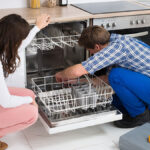You might think your daily home habits are harmless, but some quietly contribute to environmental harm. You may leave devices plugged in all day, run half-empty loads of laundry, or rely too often on single-use products. These small choices can add up fast, but you don’t have to overhaul your entire lifestyle to make a difference.
Tweaking a few routines can reduce waste and shrink your household’s environmental impact. As you explore these everyday habits and their greener alternatives, you’ll see how simple shifts help you live more sustainably and inspire those around you to do the same.
Using Microbead-Containing Personal Care Products
The fresh, smooth feeling after using exfoliating scrubs may feel great, but many of them contain microbeads, which are smaller than a grain of sand and finer than a human hair. These tiny plastic particles slip through water treatment systems, polluting rivers and oceans. They harm marine life and make their way into the food chain.
Just one milliliter of face scrub can contain up to 19,000 microplastic particles, which sorb and transport harmful substances from their surroundings. Choose personal care products labeled “microbead-free” or switch to natural exfoliants like sugar or oatmeal. You’ll get the same skin benefits without contributing to more microplastic pollution.
Pouring Old Cooking Oil Down the Drain
You might think pouring leftover cooking oil down the sink is no big deal, but it creates serious problems for your home and the environment. As the oil cools, it makes “fatbergs” that stick to your pipes and can lead to costly blockages once it enters the sewer system. Those plugs may cause the system to overflow, which releases hazardous chemicals and waste into natural waterways.
If you have a septic tank, pouring oil down the drain is even riskier. Grease buildup changes the tank’s chemistry and stops helpful bacteria from breaking down waste. Instead, collect used cooking oil in a sealed container and take it to a local recycling center or hazardous waste facility. With this habit change, you’ll protect your plumbing and keep local water cleaner.
Flushing Unused Medications Down the Toilet
Flushing old medications or disposing of them in the trash may seem convenient, but it can contaminate water supplies and disrupt aquatic ecosystems. Instead of letting unused pills or liquids harm the environment, please return them to a pharmacy take-back program.
If you must trash medication, follow local guidelines for safe disposal to keep soil and waterways healthier, protecting the environment for future generations.
Letting Food Waste Go to Landfills
When you toss food scraps in the trash, you waste leftovers and contribute to a major environmental problem. Once in a landfill, food breaks down without oxygen and releases methane, a greenhouse gas more than 28 times more potent than carbon dioxide. Approximately 30% to 40% of the U.S. food supply is wasted, along with the water, energy, and resources used to produce it.
You can make a positive impact by composting your food scraps at home or using a community composting program. Keeping valuable nutrients out of landfills reduces harmful emissions and helps create healthy soil.
Overusing Laundry Detergent and Fabric Softeners
You might love the fresh scent of clean laundry, but many detergents and softeners have a hidden environmental cost. Scented liquid laundry detergents and dryer sheets often contain chemicals that emit volatile organic compounds, which pollute the air in your home and harm aquatic organisms once they wash down the drain.
Using too much detergent releases excess chemicals into waterways, disrupting fragile ecosystems. Use only the recommended amount of sustainable detergent and skip fabric softeners altogether, or opt for natural alternatives, such as a splash of vinegar. You’ll still get fresh, clean clothes without adding unnecessary pollution to the environment.
Frequent Use of Disposable Wet Wipes
Never flush any type of wipe down the toilet. Most wet wipes contain plastic fibers that don’t break down, clogging sewers and contributing to microplastic pollution in oceans and other water systems. Even wipes labeled as “flushable” can cause serious plumbing issues and lead to expensive municipal repairs.
Use reusable, washable cloths for everyday cleaning, or choose wipes made from biodegradable materials that are gentler on the environment. With this one simple change, you’ll keep your pipes clear and help reduce plastic flow into the planet’s fragile ecosystems.
Leaving Electronics Plugged In
You might not realize it, but many of your devices continue to use electricity even when they’re turned off. These phantom loads, which electronics consume in standby mode, can account for up to 10% of your home’s total energy consumption, quietly driving up your utility bills and carbon footprint.
Unplug devices when you’re not using them, or use a smart power strip that automatically cuts off power to idle electronics. With just a few adjustments around the house, you can reduce waste, lower emissions, and save money without noticing a difference in your daily routine.
Small, mindful changes make a real difference for the environment. Swapping out these everyday harmful habits for greener alternatives helps reduce pollution and conserve valuable resources. Start today, and one small change in your routine could inspire others to do the same.
About the Author
Jane Marsh is the Editor-in-Chief of Environment.co, a source of sustainable living ideas.




GIPHY App Key not set. Please check settings